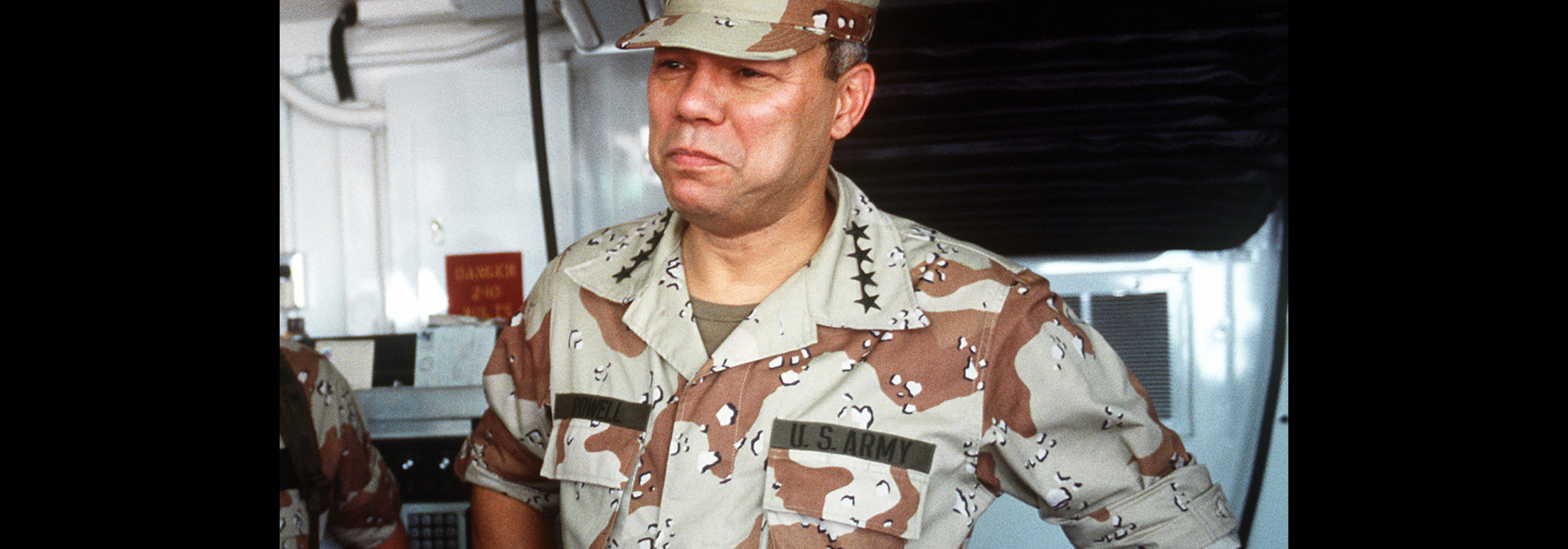Colin Luther Powell, U.S. Soldier, diplomat, and statesman, died Oct. 18 at the age of 84.
As Chairman of the Joint Chiefs of Staff, he advised President George H.W. Bush during America’s response to Iraq’s 1990 invasion of Kuwait and the ensuing swift victory in the 1991 Gulf War. He also presided over the invasion of Panama and a sharp reduction in the size of the U.S. military after the end of the Cold War. Powell faulted himself for not arguing more forcefully against a second war in Iraq while he was Secretary of State.
His death was attributed to complications from the COVID-19 virus; a breakthrough case, as Powell was fully vaccinated, but in recent years he had suffered from blood cancer that severely degraded his immune system.
Powell achieved a number of firsts for a Black man: the first to be Chairman of the Joint Chiefs of Staff, first to be Secretary of State—the only person to hold both positions other than George C. Marshall, who did so under President Harry S. Truman—and the first to be National Security Adviser. He was only the fourth Black man to be a four-star Army general. Powell was considered to be the least apolitical general since Dwight D. Eisenhower.
Powell attended New York City College and found his calling with the ROTC program there. He was commissioned in the Army and enjoyed a meteoric, 35-year career that included two tours in Vietnam. He rose to the rank of brigadier general by the age of 42, and was later tapped by President Ronald Reagan to be National Security Adviser.
At the White House, Powell, still on Active duty as a three-star general, advised Reagan on arms agreements and renewed détente with the Soviet Union, coming to national attention and establishing him in the inner circle of foreign policy experts. He left the White House in 1989 to become the four-star head of Army Forces Command. Just a few months later, however, Powell was appointed to be Chairman of the Joint Chiefs by President George H.W. Bush.
In August 1990, Iraqi strongman Saddam Hussein seized Kuwait. Powell advised that U.S. reaction be heavy and include internationally ironclad economic sanctions, but Bush decided, without consulting Powell, to reverse the invasion militarily.
Shortly after the buildup began, newly minted Air Force Chief of Staff Gen. Michael J. Dugan told reporters that if war came, a massive application of airpower would be required to whittle down the Iraqi Army, and that one goal would be to decapitate Iraq’s leadership. Soon after publication, Dugan was fired by Defense Secretary Dick Cheney, who said Dugan had given away too much information about war plans, even though most of what he said had already been revealed in the defense press. Pentagon insiders said Powell urged Cheney to fire Dugan, as Powell believed Dugan was overpromising what airpower could accomplish.
In a November 2017 interview with the San Diego Union Tribune, former Chief of Staff Gen. Merrill A. McPeak, who replaced Dugan, said that after his own inspection tour of Desert Shield preparations, he told Bush that the Air Force and other service air arms were “ready to go” but that Powell “was trying—I thought—to delay operations until the Army got ready.”
Powell eventually acquiesced to a war plan created by Army Gen. H. Norman Schwarzkopf, which closely followed what Dugan had laid out.
Powell in 1992 laid out ground rules for entering an armed conflict. “The Powell Doctrine” stipulated that the cause must be vital to U.S. security; the public be behind it; that overwhelming force should be applied to achieve rapid victory; and that an exit strategy must be set before the fighting starts.
After Desert Storm—and the self-dissolution of the Soviet Union—Powell implemented a reduction in the size of the U.S. military ordered by Bush. The “base force” concept saw about a 25 percent reduction in the force overall, though Air Force combat airpower and personnel saw as much as a 40 percent reduction.
He resisted President Bill Clinton’s moves to allow LGBTQ Airmen to serve in the military, which eventually led to the “Don’t Ask, Don’t Tell” policy.
Powell was the first Cabinet appointee of President George W. Bush, serving as his first Secretary of State.
He argued against Bush’s desire to engage in a second Iraq war, claiming that if the U.S. conquered Baghdad, it would assume the expensive responsibility for feeding and policing that nation until a new government could be installed. He later wrote that he did not argue forcefully enough against Operation Iraqi Freedom, feeling that Bush had already decided to attack and his counsel would be devalued if he continued to oppose the war.
In a February 2003 speech at the United Nations, Powell presented the case that Saddam Hussein had weapons of mass destruction that he might give to terrorists, and could not be left in power, citing U.S. intelligence. Powell’s reputation swung world opinion, but the intelligence eventually proved faulty, and he later said in an ABC News interview that his U.N. speech would be a permanent “blot” on his reputation.
